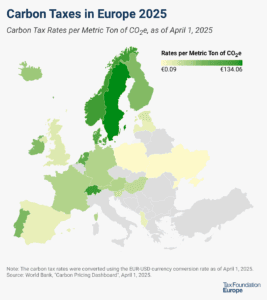
This is the fourth case study in a series on territorial tax systems in other countries. The intent of the study is to see what lessons the U.S. can learn from other countries’ experiences and to evaluate the validity of some of the fears critics express when discussing what would result if the U.S. were to move to a territorial system.
Germany has successfully implemented a system of taxation of foreign earnings, which is driven by two principles: competitive neutrality and simplicity.—Jorg Menger, German taxA tax is a mandatory payment or charge collected by local, state, and national governments from individuals or businesses to cover the costs of general government services, goods, and activities. professional, 2011[1]
Since 1920, the German corporate tax system has exempted foreign dividend income to some degree. In 1954, Germany initiated a tax treaty system whereby dividends originating within treaty-partner countries became fully exempt. To simplify this regime and to comport with rulings of the EU Court of Justice, in 2001 Germany reformed its system to terminate international expense allocation requirements and to allow deductions for all expenses related to exempt foreign income. To compensate the government for allowing deductions for costs related to tax-exempt foreign income, Germany reduced the exemption for foreign income to 95 percent, allowing tax on the residual five percent.[2]
Active income generated by controlled foreign corporations and passive income that is subject to tax rates greater than 25 percent in the original jurisdiction are eligible for exemption.[3] Also, income generated by foreign branches of German companies is exempt from German tax as long as the branch resides in a treaty country.[4] Anti-erosion measures limit the deductibility of interest surplus, ensure that losses on the sale of subsidiary corporate stock are not deductible, and levy tax on all passive income in low-tax jurisdictions.[5]
 To make the tax system more competitive for its companies in the international marketplace, Germany has recently engaged in a series of tax rate reductions. Since 1998, Germany has reduced its combined tax rate on corporate income from 56 percent to 30.2 percent.[6]
To make the tax system more competitive for its companies in the international marketplace, Germany has recently engaged in a series of tax rate reductions. Since 1998, Germany has reduced its combined tax rate on corporate income from 56 percent to 30.2 percent.[6]
Data
While operating a territorial system throughout the modern era, Germany has emerged as one of the most robust economies in the world and is considered the European continent’s “economic giant.”[7] Its GDP per capita is $40,116, ranking in the top decile of all countries, and it is the third-leading exporter in the world. [8]
 Regarding unemployment, there has been much volatility since the reunification of West and East Germany in 1990. While unemployment trended upward for several periods and reached a high exceeding 11 percent in 2005, the rate has been cut in half since that time, due in part to labor market reforms.[9] By 2011, it registered at 5.9 percent (Figure 1, above) and Eurostat reports that it is now down to 5.4 percent.[10] While much of the developed world experienced spikes in unemployment as a result of the global recession, Germany experienced only a hiccup before its rate continued downward.
Regarding unemployment, there has been much volatility since the reunification of West and East Germany in 1990. While unemployment trended upward for several periods and reached a high exceeding 11 percent in 2005, the rate has been cut in half since that time, due in part to labor market reforms.[9] By 2011, it registered at 5.9 percent (Figure 1, above) and Eurostat reports that it is now down to 5.4 percent.[10] While much of the developed world experienced spikes in unemployment as a result of the global recession, Germany experienced only a hiccup before its rate continued downward.
Germany traditionally has not relied heavily on corporate tax revenue (Figure 2, above). German policymakers have recognized the tradeoffs inherent to international taxation and as one of the world’s leading exporters, have chosen to promote the competitiveness of their companies over collecting more tax revenues.
[1] How Other Countries Have Used Tax Reform to Help Their Companies Compete in the Global Market: Hearing Before the H. Comm. on Ways and Means, 112th Cong. (May 24, 2011) (statement of Jorg Menger, International Tax Partner, Ernst & Young LLP), http://www.gpo.gov/fdsys/pkg/CHRG-112hhrg72510/pdf/CHRG-112hhrg72510.pdf [hereinafter Menger Statement].
[2] It has become standard practice among territorial systems for deductions of expenses related to foreign income to be allowed. As of 2007, only three EU countries disallowed deductibility of costs related to tax-exempt foreign dividends. See Michael P. Devereux et al., Final Report: Project for the EU Commission (TAXUD/2005/DE/3 10) (Sept. 2008), at A-18, http://ec.europa.eu/taxation_customs/resources/documents/taxation/gen_info/economic_analysis/economic_studies/effective_levels_report.pdf.
[3] See Joint Committee on Taxation, Background and Selected Issues Related to the U.S. International Tax System and Systems that Exempt Foreign Business Income (May 20, 2011), at 26, http://www.jct.gov/publications.html?func=startdown&id=2793 [hereinafter JCT, Background].
[4] See How Other Countries Have Used Tax Reform to Help Their Companies Compete in the Global Market: Hearing Before the H. Comm. on Ways and Means, 112th Cong. (May 24, 2011) (statement of Jorg Menger, International Tax Partner, Ernst & Young LLP), at 4, http://www.gpo.gov/fdsys/pkg/CHRG-112hhrg72510/pdf/CHRG-112hhrg72510.pdf.
[5] See JCT, Background, supra note 3, at 25-27 (“A company’s excess of interest expense over interest income (‘interest surplus’) is deductible only up to 30 percent of the company’s taxable incomeTaxable income is the amount of income subject to tax, after deductions and exemptions. For both individuals and corporations, taxable income differs from—and is less than—gross income. before interest, taxes, and depreciation and amortization.”).
[6] OECD, Basic (non-targeted) corporate income taxA corporate income tax (CIT) is levied by federal and state governments on business profits. Many companies are not subject to the CIT because they are taxed as pass-through businesses, with income reportable under the individual income tax. rates (2011), www.oecd.org/dataoecd/26/56/33717459.xls.
[7] Can Angela Merkel Hold Europe Together?, The Economist, Mar. 10, 2011, http://www.economist.com/node/18332786.
[8] World Bank, GDP per capita (current US$), http://data.worldbank.org/indicator/NY.GDP.PCAP.CD; Central Intelligence Agency World Factbook, Country Comparison: Exports, https://www.cia.gov/library/publications/the-world-factbook/rankorder/2078rank.html.
[9] Hartz and Minds: German Labour-Market Reform, The Economist, Dec. 29, 2004, http://www.economist.com/node/3522141.
[10] Eurostat, Unemployment Statistics, http://epp.eurostat.ec.europa.eu/statistics_explained/index.php/Unemployment_statistics (data updated to June 2012).
Share this article




